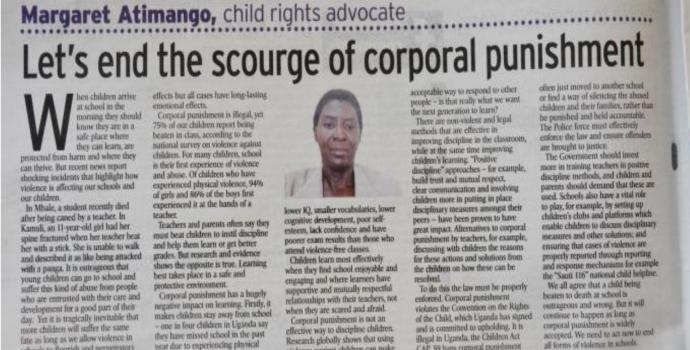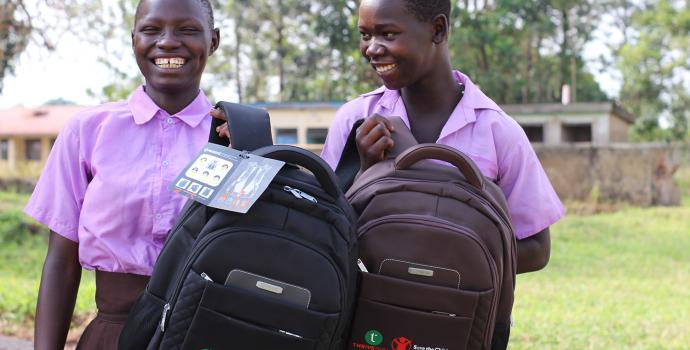We must end corporal punishment once and for all

Originally published in the New Vision newspaper
By Margaret Atimango, Head of Child Protection, Save the Children
When children arrive at school in the morning they should know they are in a safe place where they can learn, are protected from harm and where they can thrive. But recent news reports have highlighted shocking incidents of how violence is affecting our schools and our children.
In Mbale, a student recently died after being caned by a teacher. In Kamuli, an 11-year-old girl had her spine fractured when her teacher beat her with a stick. She is unable to walk and described it as like being attacked with a panga. It is outrageous that young children can go to school and suffer this kind of abuse from people who are entrusted with their care and development for a good part of their day.
Yet it is tragically inevitable that more children will suffer the same fate as long as we allow violence in schools to flourish and perpetrators are not held to account for these acts of violence against children. These cases may seem extreme, but are not. Some get in the news, others don’t but in fact they are happening across the country. Some cases have long-lasting physical effects but all cases have long lasting emotional effects.
Corporal punishment is illegal, yet 75% of our children report being beaten in class, according to the national survey on violence against children. For many children, school is their first experience of violence and abuse. Of children who have experienced physical violence, 94% of girls and 86% of boys first experienced it at the hands of a teacher.
Teachers and parents often say they must beat children to instil discipline and help them learn or get better grades. But research and evidence shows the opposite is true. Learning best takes place in a safe and protective environment.
Corporal punishment has a hugely negative impact on learning. Firstly, it makes children stay away from school – one in four children in Uganda say they have missed school in the past year due to experiencing physical violence, and it is a major reason why about 34 percent children drop out of school. Secondly, it makes them less likely to learn. Global research has shown that children who suffer corporal punishment often have lower IQ, smaller vocabularies, lower cognitive development, poor self-esteem, lack confidence and have poorer exam results than those who attend violence-free classes.
Children learn most effectively when they find school enjoyable and engaging and where learners have supportive and mutually respectful relationships with their teachers, not when they are scared and afraid.
Corporal punishment is not an effective way to discipline children. Research globally shows that using violence against children can make them more likely to be aggressive outside the classroom and can lead to depression, anger, and make children less likely to tell the truth. It also teaches children that violence is an acceptable way to respond to other people – is that really what we want the next generation to learn?
There are non-violent and legal methods that are effective to improve discipline in class, while at the same time improving children’s learning. “Positive discipline” approaches – for example, building trust and mutual respect, clear communication and involving children more in setting disciplinary measures amongst their peers – have been proven to have great impact.
To do this the law must be properly enforced. Corporal punishment violates the Convention on the Rights of the Child, which Uganda has signed and committed to upholding. It is illegal in Uganda, -the Children Act CAP. 59 bans corporal punishment and calls for protection of children from all forms of violence, yet many teachers and parents, especially in rural areas, are not even aware of this. Teachers suspected of abuse are often just moved to another school or find a way of silencing the abused children and their families, rather than be punished and held accountable. The police force must effectively enforce the law and ensure offenders are brought to justice.
The government should invest more in training teachers on positive discipline methods, and children and parents should demand that these are used. Schools also have a vital role to play – for example by setting up children’s clubs and platforms which enable children to discuss disciplinary measures and other solutions; and ensuring that cases of violence are properly reported through reporting and response mechanisms for example the “Sauti 116” national child helpline.
We all agree that a child being beaten to death at school is outrageous and wrong. But it will continue to happen as long as corporal punishment is widely accepted. We need to act now to end all forms of violence in schools.




